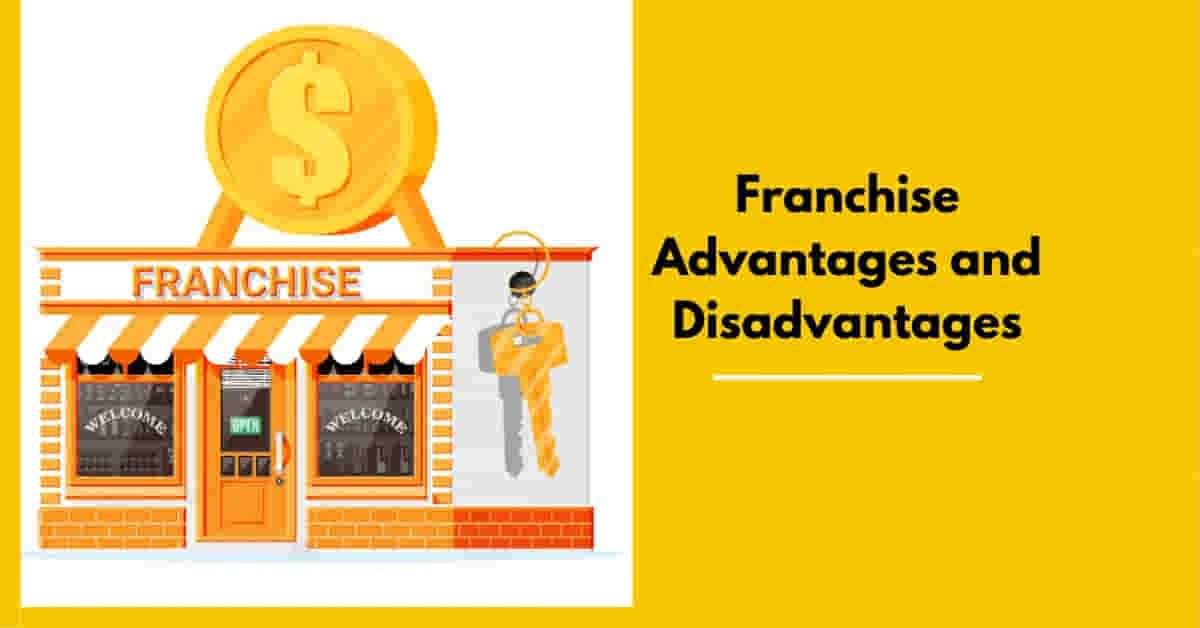Franchising offers many franchise advantages and disadvantages for you to take decision on buying a franchise or franchising your business.
For many years, the US Department of Commerce, the Small Business Administration, the trade press, and franchise associations promoted the idea that franchising was a surefire way of business expansion and a secure investment for both franchise owners and franchisors.
According to the United States Census Bureau, franchises make up 10.5 percent of all industries.
Veteran franchisees account for about 14% of all franchisees. Veterans will own 66,000 franchises by 2021, contributing $41 billion to the economy.
As per estimates,there are more than 780,000 franchise enterprises in the United States.
In addition, franchise employment is set to rise more than 10% to nearly 8.3 million workers. It added that of the nearly 800,000 expected new jobs, many will come from the retail, food and services sectors.
The IFA forecast, prepared by research and consulting firm FRANdata, projects the gross domestic product of the franchise sector will increase by 7% to $477.4 billion and franchise business output will jump 16.4% to $780 billion.
What is franchising?
Franchising is a business model in which a company, known as the franchisor, expands the reach of an established concept through a network of franchisees.
The business concept, product, and systems must all be scalable and teachable to new franchisees. It’s likely that if it’s a successful brand, it’s been franchised.
Franchising comes with its franchise advantages and disadvantages, which you need to deal with and grow your business and achieve your goals.

Examples of franchising
Fast food, restaurants, gas stations, supermarkets, beauty salons, tyre experts, service centers, and the list goes on, and franchising marketing continues to increase year after year.
This is fantastic news for franchisors, franchisees, and potential franchisees.
While a well-planned franchise programme can be an excellent way to expand, improperly designed and cookie-cutter franchise systems, as well as poorly managed enterprises, are not.
This isn’t simply a franchise issue; it’s a business one as well.
Before deciding whether or not you’re cut out to become a franchisor or franchisee, you should be aware of some of the pros and cons of franchising.
What are the franchise advantages and disadvantages of franchising your business?
Let’s begin with the advantages of franchising to a franchisor.
Advantages of franchise business

1. Speed of Growth
Because the franchisee undertakes the majority of these responsibilities.
Franchising may be the only option for businessmen to assure that they establish a leadership status before competitors infringe on their territory.
Of course, the franchisor assists, but the franchisee is responsible for the actual job.
Franchising provides the franchisor with not only financial resources but also human resource leverage.
Franchising helps small enterprises to compete with much larger corporations, allowing them to saturate marketplaces before they can respond.
The speed of growth is one of advantages of franchising among the franchise advantages and disadvantages shared with you in this article.
2. Willing investors
The most important argument for franchising a business plan is that the entrepreneur of the company can get his or her claws on other people’s money – in a fully legal and proper manner.
Franchisees pay the fee and receive a business with a strong opportunity of profiting. However, for the franchisor, the benefit of pooling the funds of several franchisees is that it allows him / her to grow its business more quickly and readily than if they invested their own money, borrowed from a bank, or raised equity capital.
Franchisees offer the funds to establish new locations, plus their joint forces, if carefully acquired, will allow for rapid global expansion than would otherwise be achievable. This is especially important when introducing a fresh item, as national regulations might be complicated.
3. Ease of Supervision
Franchising has additional advantages from a management standpoint. For starters, the franchisor is never in charge of the day-to-day operations of the franchised businesses.
Furthermore, because a franchisor’s revenue is often based on gross sales rather than profitability, keeping track of unit-level expenses is significantly easier.
Franchising frees you up to focus on the larger picture by taking care of this burden. Your duty as a franchisor is to emphasize strategy, both at the micro-level (increasing unit performance) and the franchisor level.

4. Reduced Risk
Furthermore, franchising decreases risk for the franchisor because of its very nature. Unless you opt for a different system, the franchisee is solely responsible for the franchise operation’s expenditure.
He pays for any construction, acquires any merchandise, hires any staff, and is responsible for any working capital required to get the business up and running.
However, your franchise lawyer as well as other experts are quite likely to suggest that you form a new legal business to serve as the franchisor. Your exposure will be reduced even further.
And, because becoming a franchisor is generally less expensive than opening a new site, your beginning risk is significantly decreased.
5. Capital Leaverage
As a means of capital acquisition, franchising has some advantages. Most entrepreneurs choose to franchise because it helps them to grow without the danger of debt or the cost of equity.
For starters, because the franchisee supplies all of the capital required to build and manage a unit, it lets businesses develop by leveraging other people’s resources.
The franchisor can develop largely debt-free by borrowing money from others.
Franchising offers greater flexibility with practically no contingent liability because the franchisee, not the franchisor, signs the lease and agrees to various contracts. This helps to reduce the risk to the franchisor.
As a result, not only do you need significantly less capital to grow but your risk is essentially confined to the capital you put in establishing your brand name, a sum that is generally less than the cost of opening one more company-owned location.
6. Staffing Leverage
The franchisor can operate effectively with a considerably leaner company thanks to franchising.
Franchisors can use these initiatives to cut total headcount by having franchisees take on many of the activities that would otherwise be handled by the company headquarters. While franchisors normally have a marketing department, all local marketing is usually coordinated by the franchisees.
Human resources are the same way; because the franchisee handles all unit-level employment, this function is often much smaller in a franchised firm.
For the most part, administrative services like finance, accounting, legal, real estate, and so on can be assumed to be either understaffed or outsourced inside a franchisor business.
7. Owners put forth more effort
Salaried personnel are prone to giving their finest when it benefits them or unless they are heavily compensated; at other instances, the temptation to skive might be difficult to resist.
Once someone controls a business, however, their overall mindset shifts: removed is the desire or urge to accomplish merely what is necessary, and in enters a want to curl up one’s sleeves, spit on one’s hands, and get to business.
If everything goes well, the franchisee’s desire to labour nonstop should be to his or her benefit: it is undoubtedly to the franchisor’s profit.
If you gave a new business owner and a franchisor both a standing start, it’s a safe bet that the franchisor’s troops of entrepreneur would knock locations off the manager’s employees.Then,delivering improved results in terms of gaining market share, maximising efficiency, cutting expenses, and increase profitability. That is the nature of humans.
Franchise Disadvantages
After considering the above benefits of franchising, we consider the disadvantages of franchising.
1. Everything is out of hand.
Inside the franchisor’s ideal world, he or she would gain from the franchisees’ passion, enthusiasm, and desire to succeed, as well as the ability to bring all the strings at any time.
Franchisees, on the other hand, really aren’t dummies. They own their businesses, therefore while they aren’t completely free to do whatever they want, they aren’t easily moved around.
Salaried employees, on the other hand, can be fired and penalised (as long as the employment regulations are obeyed).
The ideal franchisee is someone who is inclined to obey the established practises while also having the foresight to recognise and capitalise on business ideas.

2. Conflict
The franchisor-franchisee relationship is created on shared trust and confidence. Consistent direction, polite contact and addressing with little problems before they develop and evolve into something bigger, like with all relationships, is the best way to do this.
If neither party makes an effort, the franchisee may feel disappointed and angry of the franchisor’s engagement, which he or she may perceive as inappropriate and obtrusive.
Any deterioration in confidence could escalate rumbling dissatisfaction with the settlement of service management prices. An unpleasant connection between the franchisor and the franchisee may lead in the latter growing difficult and concealing facts, according to the franchisor.
3. Insiders can revert to being outsiders.
In a franchise partnership, ingratitude and betrayal are two unfortunate sides of the human nature that may appear. The possibility that a franchisee, after seeing and experiencing the firm from the inside and mastering the know-how and procedures, will leave to start a competing company in the same industry must always be at the rear of the franchisor’s mind.
Unfortunately, this is human nature, and the savvy franchisor prepares for the dreaded day when a disgruntled franchisee arises in the middle of the chain. As a result, several franchise agreements include a provision prohibiting a departing franchisee from establishing a competing business within a certain period of time.
4. Money from other people, as well as own.
Although franchisees supply critical money for the firm to grow, it would be a common misperception that the franchisor can kickstart on a shoestring budget.
The cost of pilot testing, not to forget the risk, as well as the cost of hiring and training franchisees, are all factors to consider. Even so, it may take a little time for fee revenue to cover all cash outflows and bring the franchisor to break-even.

5. A delicate balancing act
The ideal franchisee, such as the ideal spouse, is mysterious: the finest will be dedicated and industrious, while the worst will be lazy and disinterested.
Most challenging type of franchisee in a franchise arrangement is one who is lazy, but not so sloppy that he or she violates any of the provisions of the agreement.
This puts the franchisor in the unfortunate situation of knowing a faulty part of the network with little power to address it, short of taking out the misbehaving franchisee at an exorbitant price.
6. There are fewer options available.
As previously stated, a franchised unit must produce a gross margin that allows both the franchisee and the franchisor to make a respectable profit. As a result, the franchisor would make more money if the franchisee didn’t exist.
This isn’t a massive drawback; rather, it’s a matter of the franchisor daydreaming about what could have been if he or she had opted to develop sans franchising.
The franchisor would prefer to have it both manner: a slew of brash entrepreneurs establishing the business, as well as all of the profits. Truth has a different perspective.
This puts the franchisor in the unfortunate situation of knowing a faulty part of the network with little power to address it, short of taking out the misbehaving franchisee at an exorbitant price.

7. High investment for brand name
The downside to this is that you will have to pay for the brand name in terms of initial franchise fees, on-ongoing royalties and marketing fees.
The ideal franchise fees for premium brand should be less than 20% of complete franchise investment.
Conclusion
When the franchise advantages and disadvantages are considered, it is clear that the franchise relationship is a strange, if not peculiar, manner of doing business.
The business concept and infrastructure are owned by the franchisor, but the individual stores are not. The franchisee has his or her own business, but not the liberty to do whatever he or she wants.
The franchisor has some control over the firm, but only to a certain extent.
The more you think about it, the more clear it becomes that, assuming the franchise model is legitimate, the success or failure of the franchisee-franchisor relationship is based on a their partnership.
Let us summarise the 7 franchise advantages and disadvantages
Franchise advantages and disadvantages
| Advantages | Disadvantages |
|---|---|
| Speed of Growth | Everything is out of hand |
| Willing Investors | Conflict |
| Ease of supervision | Insider can be competition |
| Reduced risk | No complete ownership |
| Capital Levarage | Delicate balancing |
| Staff Levarage | Fewer Options Available |
| Owners Put more effort | High Investment for brand name |
Similar Franchise opportunities to look for
- Franchise Portal: Best Lead Generation Portals
- Cheap Franchises to Start under $1000 to Buy in 2023
- What does Shaq own? Franchises, Companies Business in 2023
- Software Franchise Opportunities : IT Company Business
- Franchise Seo Services For Company and Franchises
- Sandwich Franchises : Top and Best Franchise in 2023
- The Truth Behind Popular Asian Food “Teriyaki Madness” Franchise
- Popular Franchises in US : 20 Top Most in 2023
- Best Cars Franchise Opportunities to Buy in 2023
- Best and Most Valuable Sports Franchises Opportunities to Buy in 2023






Knowing the advantages and disadvantages of any franchise is really important as it will helo you in building a great business model with logic. The article is really helpful to learn this.
One of the main advantages of a franchise is that it provides an established brand, which can help to attract customers. Another advantage is that the franchisee has access to the franchisor’s resources, such as marketing materials, training, and support.
A franchisee can benefit from the franchisor’s economies of scale and buying power.
The franchisee can also benefit from the franchisor’s expertise and knowledge. Franchisors also provide assistance in choosing locations and negotiating leases.
However, a franchisee may be restricted in terms of the products and services they offer, and in how they can market their business.
Franchisees may also be subject to high fees, such as royalties and advertising fees, which can reduce their profitability.
Franchising can also be risky for franchisees, as the franchisor may be able to terminate the agreement at any time.
Franchisees may also be required to invest significant amounts of capital, which can be difficult to recoup.
Franchisees may also be restricted in terms of the hours they can work, and the number of employees they can hire.
Franchises can also be difficult to sell due to their unique nature.
A franchisee’s success is also dependent on the success of the franchisor. Franchisors may also require franchisees to sign long-term contracts, which can be difficult to terminate. Franchises can also be expensive to set up, and require a significant amount of time and effort.
Finally, franchises may not be suitable for all entrepreneurs, as they require a unique combination of knowledge, skills, and resources.